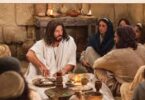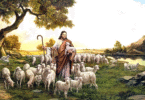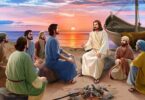Pentecost Sunday (Year B)
Scripture: Acts 2:1-11; Ps. 104:1, 24, 29-30, 31-34; 1 Cor. 12:12:3-7, 12-13, Jn. 20:19-23
Today we celebrate the solemnity of Pentecost. It is one of the important feasts in the church and it is also called the birthday of the Church. Pentecost is a Greek word and it means fiftieth. It falls on the fiftieth day after Easter. The Jews celebrated this feast with great importance for a number of reasons. They called the feast Shavuot in Hebrew or the feasts of the weeks. It is one of the three important feasts in the Jewish religious calendar. The other feasts are the feast of Passover and the feast of the tabernacle. The male Jews living within twenty miles of Jerusalem were bound to attend the worship in the temple. Therefore, these festivals were called pilgrim festivals.
The feast had its origin in the thanksgiving after the harvest. The Jews offered during the Passover the first omer (Hebrew measurement) of barley to God and at the Pentecost, they offered two loaves in gratitude for harvest as a thanksgiving. This was the original motif of Jews. The people would bring the barley with great pomp and ceremony. They thanked God for the fruits of their labour. After the destruction of the second temple, the Jews dispersed. The agrarian motif was forgotten and the element of the covenant was remembered.
The Jews remembered that God made a covenant with Noah after the deluge on the fiftieth day (Gen 9). Much later, they added the Sinaitic covenantal aspect to the feast. God gave Moses the Ten Commandments on the fiftieth day after they started their journey of Exodus. (Deut. 4:10-13). The Ten Commandments are considered the Torah (the first five books in the Hebrew Bible).
The Jews also called it the feast Atzeret meaning the completion. The Jews were physically liberated on the day of Passover from the land of Egypt but they also needed liberation spiritually. God made a covenant with them by giving them the law. Thus the liberation was completed. The Jews felt that they were liberated from Egypt in order to receive the Law on the feast of weeks or Shavuot.
The Jewish Midrash is an oral tradition that was written down which says that God had proposed the Torah (law) to seventy nations. They did not accept without knowing what it was. After having listened, they gave excuses. God finally turned to Israel. Israel accepted it without knowing it while saying, “all that the Lord says we will do”. (Ex. 19:8) The Jews give the same response on the feast of Shavuot after reading the Torah. As part of the celebration, they also read the book of Ruth who was a non-Jew. She had a deep love for God and the Torah which led her to accept Judaism.
While understanding the background of the feast of Pentecost, my mind started pondering in awe as to how God carefully chose the day to pour out His Holy Spirit on his disciples. Each Jewish element gets a fuller meaning in the light of Jesus Christ. On the day of Passover (Pasch), the Jews slaughtered the lamb (Exodus 12:1-3, 8, 11). Jesus is the lamb who was slaughtered on the cross and sealed the new covenant by his blood. It was reconfirmed with the Holy Spirit on Pentecost. God gave the law (the Torah) on Mt. Sinai which was written on the stones. Jesus gave new law “love one another as I have loved you”. He wrote it by the spirit on the heart. It was prophesied by Ezekiel centuries ago. (Ez. 36:27). The Jews also offered the first fruits of the harvest to God. Jesus offered his disciples who were filled with the Holy Spirit to God as the first fruit of his labour on earth. The Jews celebrated the completion of liberation. Jesus completed the divine revelation after his death and resurrection on the fiftieth day by sending his spirit over his disciples. The spirit guided his disciples to know the truth. The Jews read the book of Ruth on the feast of Shavuot. They admired her faith in Yahweh for she was a non-Jew. We have a new Ruth in the person of Mother Mary. She was present on the day of Pentecost to pray with the disciples in the upper room. Today, we admire her because she becomes the model of faith.
As we celebrate the feast of Pentecost and admire the marvellous plan of God in choosing the day of sending his spirit on the disciples, let us allow the Spirit of the Lord to fill our hearts and minds. That we may assert like the Jews, “all that the Lord says we will do”






